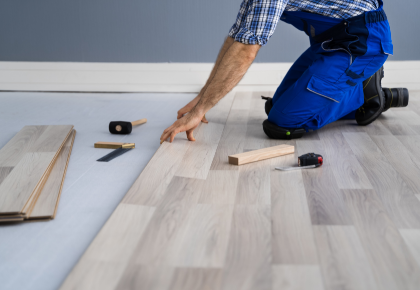Many municipalities in Alberta have rules regarding noise levels. For example, most have bylaws that specify allowable sound levels, length of time, and time of day. These laws apply to condos as well; however, noise can still be a common problem when you live in a condominium community.
You've probably received your share of noise complaints as a board member. Perhaps a resident questioned whether a herd of elephants had moved in upstairs. (You, of course, assured the resident that there are size restrictions for pets!)
So are the upstairs neighbours just ignoring the law? It could have more to do with the way your building's floors have been constructed. Flooring is a significant contributor to how sound conducts, and it can affect how much noise residents hear.

This is not a simple issue for your condominium board to address, but a condo flooring policy can help you manage noise issues. The following tips can start you on the right course in creating a policy that works for your community.
See what your governing documents stipulate about flooring
Your condominium corporation’s bylaws should already specify what kind of flooring is allowed. Can homeowners put down anything other than carpeting? Are there soundproofing specifications? These are just some of the questions it should address. It’s also beneficial to review Alberta’s Condominium Property Act to ensure the policy falls in line with The Act.
You also need to determine if there is a well-defined process for residents to follow if they want to install new flooring. This way, your condo board will be aware of residents’ flooring plans, including the materials they will use, how they will meet sound requirements, and the contractor who will handle the installation.
Consult with qualified experts
Non-experts such as lawyers, board members, or developers often create a condo's flooring policy. These well-meaning experts do not always have the specialized knowledge to develop appropriate policies for specific issues, yet they don’t always obtain input from people who do. Product specialists, acousticians, or architects can ensure that your flooring policies are sensible and structurally sound so your condo corporation can avoid problems in the future.
For example, acousticians understand how factors like materials, building plans, and ceiling and flooring assemblies (subfloors, gypsum board attachments, and insulation) can affect sound transmission. They can tell you if it makes sense for new flooring to meet the same sound rating as the original floors. They can also determine how much noise other residents will hear when a particular type of tile or hardwood flooring is used in combination with certain construction approaches or with different amounts of isolation.
Create an approval process
Although some do-it-yourself builders may do a good job, most think they are better than they are. Lack of knowledge can result in homeowners using inappropriate materials or applying faulty workmanship. You can avoid subjecting residents to noise issues down the road by requiring homeowners to submit flooring plans both to the condo board and to a sound or floor products expert before doing the work.

You should require that homeowners who hire contractors to install their flooring submit flooring plans as well. They should also be required to provide the contractor's credentials, licenses, references, and other information to verify the contractor's work quality. It's vital to ensure the approval isn't too arduous, so residents don't decide to skip it and hope for the best.
Provide a way for residents to file a complaint
Unfortunately, it’s possible that even when residents follow all the rules, one of their neighbours will experience more noise than before. Having a straightforward process for residents to voice their complaints about noise lets them know that the condo board will hear and address their issues.
An experienced and knowledgeable property management company can help guide you when determining the plan for how your condo board will handle the complaint. Suppose it's determined that the complaint is a result of a legitimate bylaw infraction. In that case, the property manager will assist the board with infraction protocols and enforce the policy throughout the community moving forward.
It’s recommended that your condo corporation’s attorney also review the policy and infraction protocol to ensure these issues can be handled by mutual agreement and not result in legal action.
Share your approved condo flooring policy
After your condo board, your condominium management company and your legal advisor have reviewed the policy, your board should do its due diligence to communicate the new policy effectively with residents. Your condo management company can help you determine how to communicate the new condo flooring policy with your residents.
A good way to share the new policy is on your condo corporation’s website and social media sites if they host them. You will probably want to share the policy via email and possibly postal mail, too. Consider having a homeowner meeting so you can explain it in more detail and take questions. Alternatively, you can hold seminars to educate residents.
All policies and bylaws of the condo corporation are essential for a new resident to know, but this can be especially true of policies related to home improvements. New residents can be eager to make their new home truly theirs which is why it’s imperative they know the ins and outs of their condo policies. The last thing a new resident wants to do is unknowingly break a rule.
Policies are not designed to stifle homeowners

Of course, your condo corporation doesn’t want to put unrealistic limits on how a homeowner can or cannot improve their own space. Setting reasonable policies for your condominium allows everyone to enjoy their homes while minimizing unnecessary disruptions. Creating a flooring policy can be tricky, but if your board performs its due diligence when creating the policy and ensures it’s clearly communicated within the community, noise complaints caused by flooring should be minimal.
For more information on how to draft flooring policies for your condominium, contact FirstService Residential, North America’s residential property management leader.